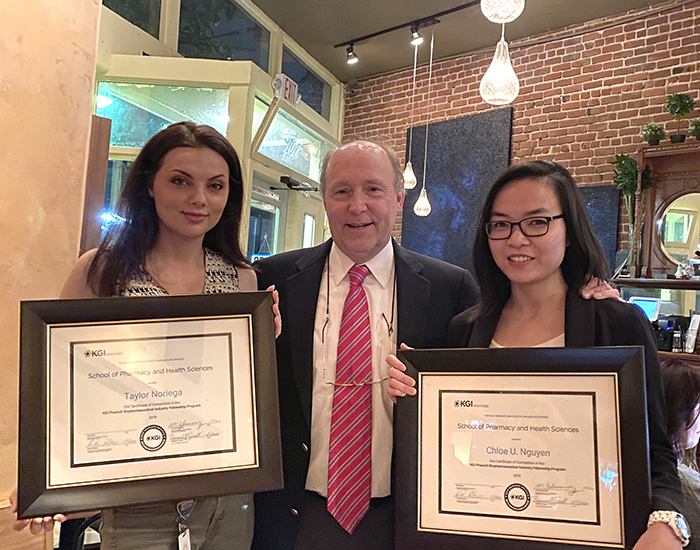Dr. Taylor Noriega and Dr. Chloe Nguyen have both experienced tremendous success in the Biopharmaceutical Industry Fellowship Program with Keck Graduate Institute (KGI) in partnership with Profusa, Inc. They began the program on January 1, 2019. Based on their fellowship work, they have now landed positions with Profusa in Medical Affairs, where their responsibilities include overseeing clinical trials for biosensors.
Profusa is developing two main products, the Lumee™ oxygen sensor and the Lumee™ glucose sensor. The Profusa Lumee™ sensors are minimally invasive hydrogels designed to be inserted just a few millimeters below the surface of the skin, monitoring either oxygen or glucose levels.
While Noriega is involved with medical and regulatory projects related to the oxygen sensor, Nguyen has been designing clinical trials for the glucose development process for patients with diabetes, including preparing for a new trial in Vietnam.
Diabetic treatments have progressed remarkably over the last century. Nguyen describes the day when purified insulin extract was first used on a large scale.
Three scientists—Frederick Banting, James Collip, and Charles Best—went to a pediatric ward where children were dying from diabetic ketoacidosis (DKA), administering insulin injections to comatose children. They were successfully able to revive these children from what was an inevitable death at the time.
"Magic happened that day," said Nguyen. "A whole ward of dying kids woke up because of insulin, and it was only a hundred years ago. Now the challenge is to improve diabetes treatment and management even more."
She believes that glucose monitoring devices will relieve much of the burden from patients with diabetes.
During her fellowship, Nguyen learned the importance of teamwork—specifically, how to work with people who had different approaches to a problem.
"You must be able to view everything with an open mind but at the same time know when to push back and speak up," said Nguyen. "It's quite a beautiful dance."
She also learned to place her trust in others by delegating responsibilities.
In her department, Noriega has been tasked with projects to support Profusa's oxygen monitoring device, which involves coordinating with people from a broad array of disciplines including regulatory, clinicians, and engineers. As a result of this multidisciplinary team effort, Profusa recently received Conformité Européenne (CE) Mark approval to market its Wireless Lumee® Oxygen Platform for continuous, real-time monitoring of tissue oxygen in patients with potential acute and/or chronic changes in tissue oxygen levels who may benefit from monitoring. Although the Lumee Oxygen sensor is primarily targeted toward individuals with Peripheral Artery Disease, oxygen monitoring can potentially be used for other applications such as athletic training and for individuals with sleep apnea.
"Ideally, I would be interested to see devices that monitor conditions that currently are heavily reliant on medication," said Noriega. "As pharmacists, we always aim for that sweet spot of just enough medication to keep the condition under control, but not so much that the patient experiences heavy side effects."
She believes that medical devices could help them to better achieve that sweet spot.
One challenge that Nguyen and Noriega shared was making the transition from an academic environment to the high-stakes world of industry.
"This is a huge learning curve," said Noriega. "You hit the ground running, and we were treated just as employees, expected to have high performance and high yield in the work that we did."
Noriega learned to mediate this through open communication, addressing her concerns with her supervisor and asking for help when necessary. At the same time, she discovered that optimism makes all the difference.
"A lot of the work we do at times seems impossible," said Noriega. "But even when you feel absolutely up to your eyes in responsibilities, the only way out is through, and you will make it through. So why not have a positive attitude from the beginning?"
In Nguyen's case, she found that challenges and opportunities often go hand-in-hand.
"Glucose monitoring and diabetes management is a massive field, and everyone tries to race towards solutions to improve patient health and quality of life," said Nguyen. "We stand on the shoulders of giants. But this also gives us a lot to learn and improve upon. Not only you can learn from the past, but you can also use your imagination, creativity, and knowledge to make things better."
